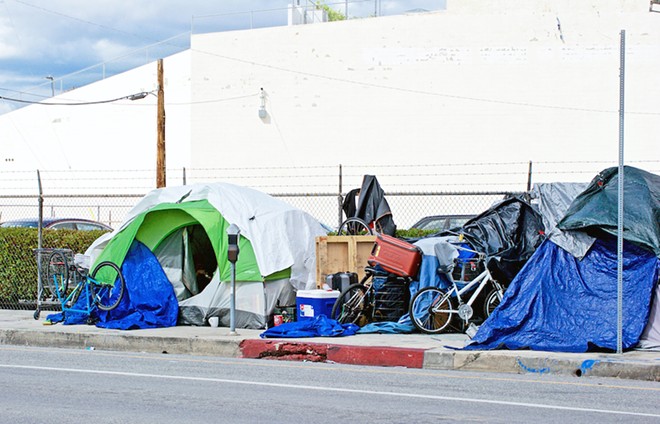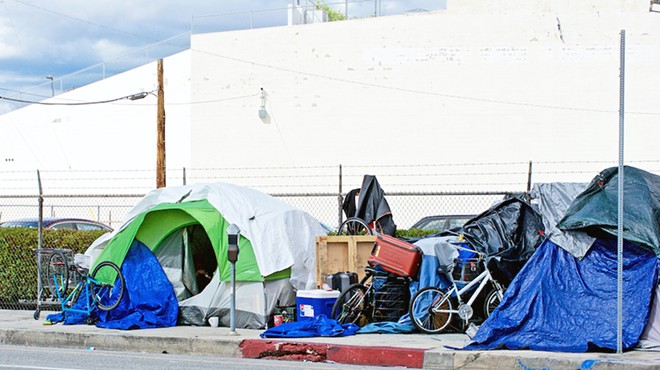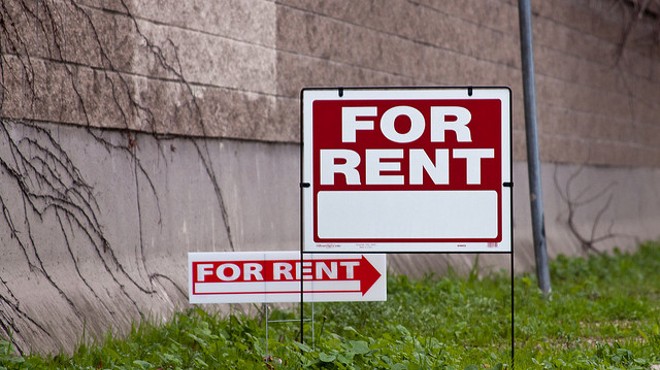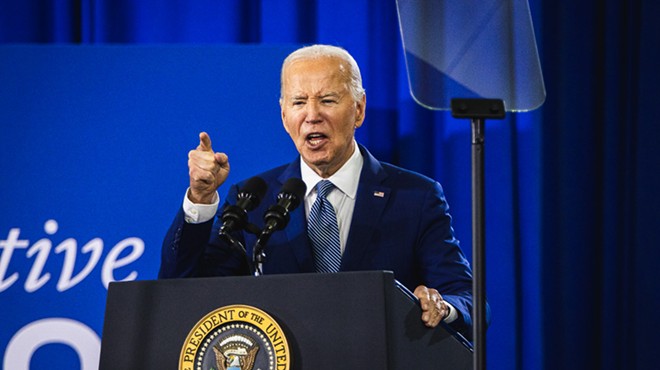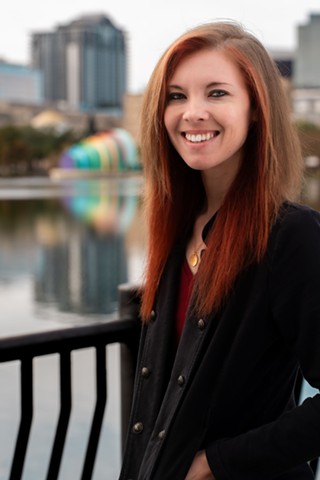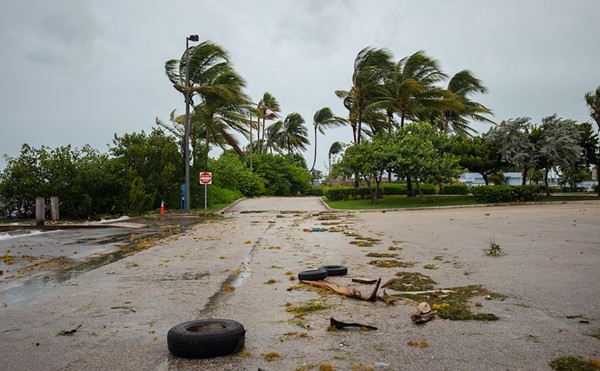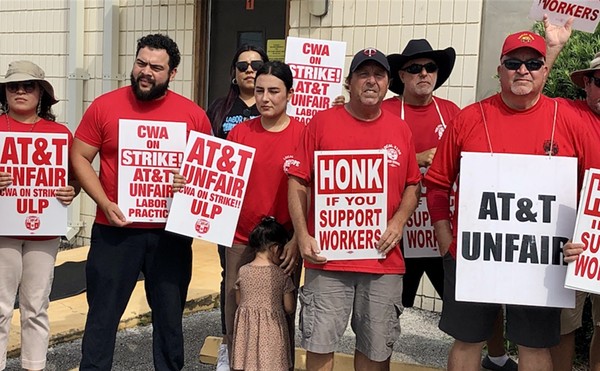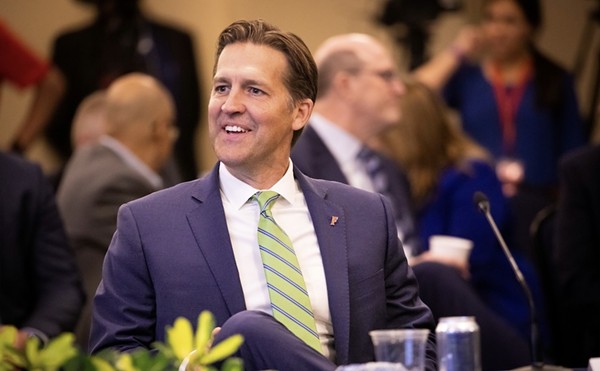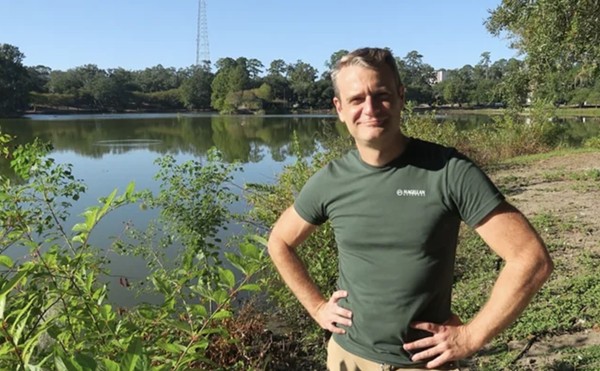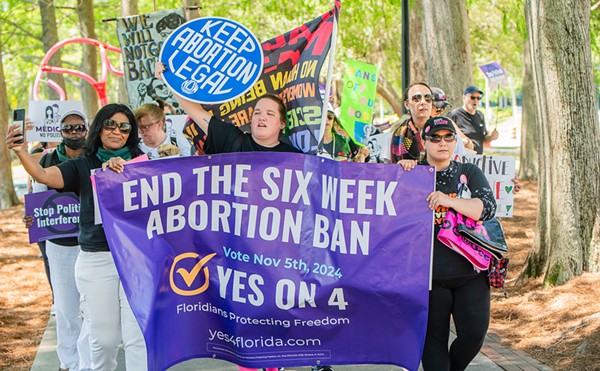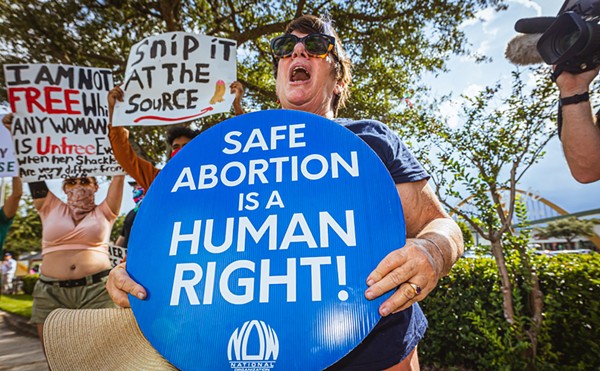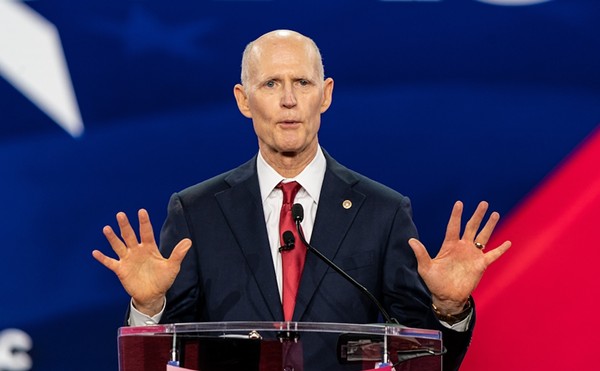“After speaking with several community members, Mayor Dyer decided to remove the item from the agenda,” Andrea Otero, public information officer for the city, told Orlando Weekly over email. “We plan to continue gathering feedback from residents and determining the best ways to address the homelessness crisis.”
According to reporting from Spectrum News 13, an initial meeting Tuesday night to discuss the initiative was met with a wave of negative feedback from residents of the area where the proposed open-access shelter would have been established. The city announced earlier that day that they had narrowed down a location they felt was fitting for what they had in mind: a 21,000-square-foot facility at 2140 W. Washington St., just a couple of miles west of downtown in District 5.
Neighborhood residents, however, reportedly pleaded for the city to consider investing in a shelter location somewhere else, due to what they see as an over-concentration of homeless services and programs already established in their area.
“Why is it that some of these entities can go in other neighborhoods and mess their neighborhoods up? How would you feel if you come home, and somebody got your water hose on and drinking out of it, or taking a shower?” asked resident Tracy Anderson.
Shan Rose, the newly elected interim commissioner for District 5, acknowledged residents’ frustration. “These are mothers, fathers, brothers, sisters who are often homeless and that’s the reason why we have to come together,” said Rose. “District 5 unfortunately has the bigger burden of social services and so residents are saying no more here and that’s what we heard tonight.”
Martha Are, head of the Homeless Services Network of Central Florida nonprofit who attended the meeting Tuesday night, conceded that residents had “legitimate concerns” and stressed that new shelters are needed across the tri-county region, not just in District 5.
“Every county needs additional [shelter] capacity, and simultaneously, we have to create more housing opportunities for our citizens,” Are told Orlando Weekly, adding that homelessness has become a growing problem along major corridors.
“When we have more people becoming homeless, but we don't increase our shelter capacity — the shelters are full,” Are stressed. “There's no place for people to go, and therefore they're out there, unsheltered. They're out on the streets, and that dynamic is going to continue unless we add some shelter bed capacity.”
A point-in-time homelessness count in Central Florida — covering Orange, Osceola and Seminole counties — conducted by Are’s nonprofit and volunteers earlier this year identified a 105 percent increase in the number of people in the region who are unsheltered, and are left to find shelter on the streets and sidewalks or in the woods. An estimated 1.3 million low-income families in Florida are severely cost-burdened, meaning at least 50 percent of their household's monthly income is going toward rent and utilities.
Existing shelters in the Orlando region are full, said Are. “Most of the existing shelters have been around for more than 25 years. We haven't seen new shelters since then.”
Orlando’s decade-long struggle navigating the issue of homelessness was exacerbated during the pandemic, as local rents skyrocketed, the housing market tightened, and the region saw an influx of residents who could afford housing that longtime locals had been priced out of. “It’s our neighbors, it’s our mothers, it’s our grandmothers” who are on the streets, said Are. “You know? It's children, brothers.”
The city of Orlando’s proposed $7.5 million investment in a new shelter — placed on pause this week — would come from the city’s Accelerate Orlando fund, a pool of federal funding the city received from the Biden administration’s American Rescue Plan Act of 2021. The city earmarked $58 million in funds total for Accelerate Orlando, a plan created specifically to address the city’s affordable housing crisis.
Millions of dollars from that fund have already been approved for projects like a hotel conversion off Colonial Drive, mixed-income affordable housing development, investments in local homeless service organizations (including the HSN) and financial assistance for low-income residents to help cover housing repairs or down payment costs.
The idea of this new proposal was to establish what’s known as an “open access” shelter: a shelter that would be operational 24/7, with a low bar to entry, offering basic helpful services like employment assistance, healthcare and counseling to help people find feasible housing options.
Local housing advocates, including Are, stress that not only are local individuals and families struggling with a lack of housing, but also access to viable job opportunities, affordable childcare, and treatment for mental health and substance use problems that can be exacerbated by the experience of homelessness.
“The best operated shelters for communities that they are in are the ones that are open 24/7, where you have staff who are working with people during the day to help them with their employment options, to help them access the healthcare services, mental health services that they need,” said Are. Those programs “can get better outcomes” she explained, “and they are less disruptive to a community because you don't have people walking around.”
She also acknowledged that some people who are homeless aren’t always willing to go to a shelter due to a bad prior experience with a shelter, or because existing shelters aren’t accommodating for people with pets, for unmarried couples, or for people who lost or had their valid forms of identification stolen.
“There’s a lot about how a shelter gets structured that can make a difference in how effective it is for populations that have pretty valid reasons for not going into other facilities,” Are said.
The problem extends beyond the Orlando metro area. The Sunshine State at large has become increasingly unaffordable, particularly for those who are low-income or who live on a fixed income from disability or Social Security payments.
Even more, the state’s most politically influential industry lobbying groups have in recent years successfully pushed state legislators to gut local tenants’ rights laws, legalize scammy security deposit alternatives, ban rent control and ease building regulations that serve to benefit their members, while running the risk of throwing average Floridians under the bus.
A new Florida law, approved by the GOP-controlled state Legislature and Florida Gov. Ron DeSantis this year, could even further strain existing resources in communities. The law, originally pitched by an out-of-state think tank called the Cicero Institute, bans cities and counties from letting homeless people camp on public property and, effective Jan. 1, will allow individuals and businesses to sue a local government that fails to enforce the ban (while allowing a five-day period to cure).
“They're now forcing us to do something about it, but they're not giving us the funding,” Orange County commissioner Emily Bonilla said of the state, during a county meeting earlier this summer in June.
Other local leaders have tried to remain optimistic. “I feel pretty confident that we're not in the business of incarcerating people for being poor, for being homeless or housing insecure,” said fellow county commissioner Mike Scott, during a legislative briefing on the bill in March. “I think even, notwithstanding this bill, I think we can meet the challenges to be able to serve those who are struggling with homelessness.”
Subscribe to Orlando Weekly newsletters.
Follow us: Apple News | Google News | NewsBreak | Reddit | Instagram | Facebook | Twitter | or sign up for our RSS Feed

